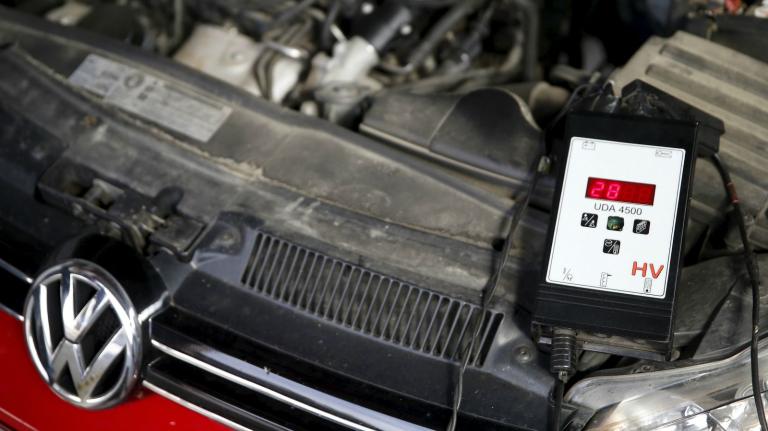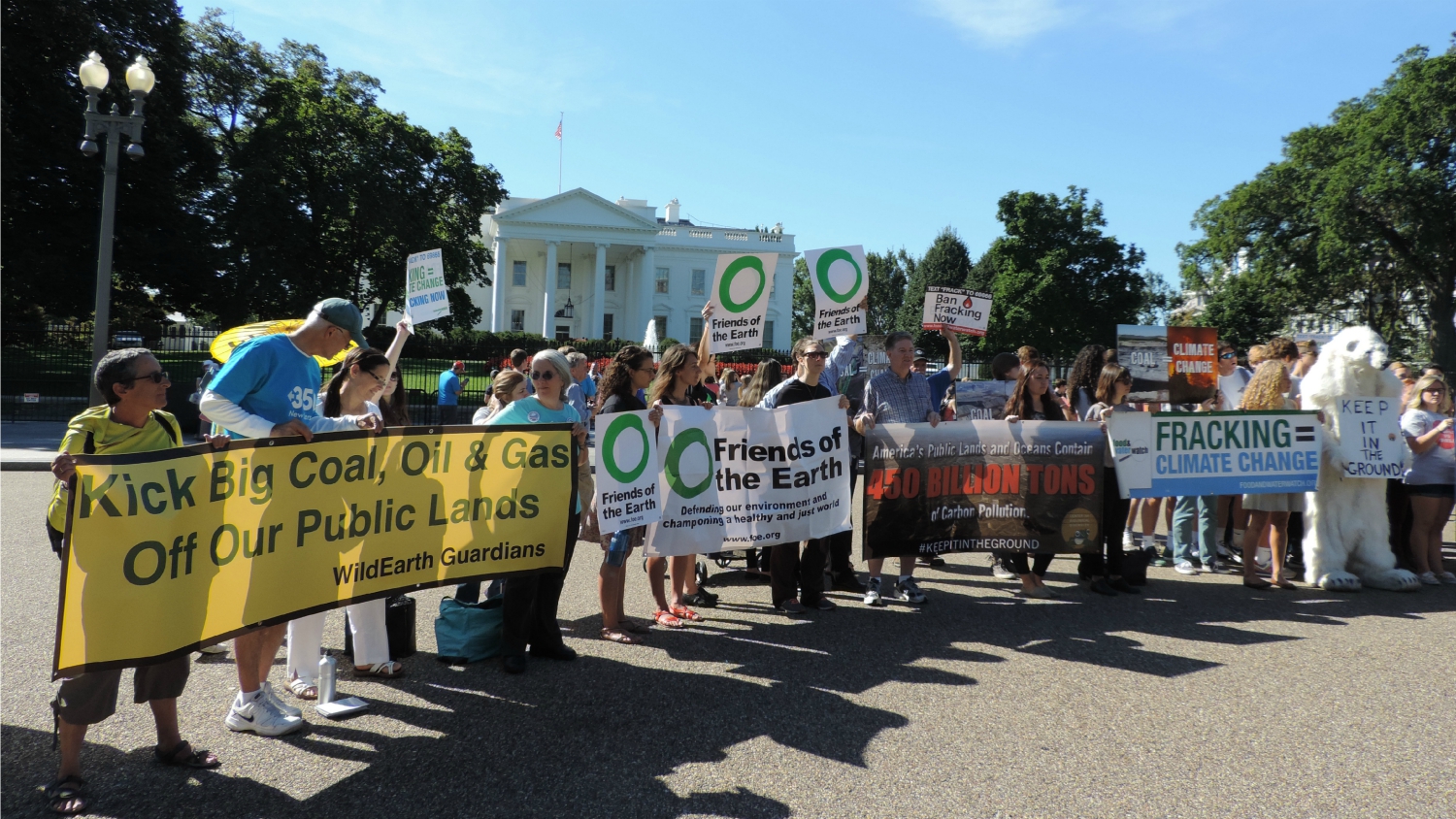Earlier this month, in New York City, 350.org — the organization most associated with the campaign against Keystone XL — nearly filled the 2,090-seat opera house at the Brooklyn Academy of Music for headliners Bill McKibben and Naomi Klein to talk about climate change. That many people listening to a couple of nonfiction writers discuss an environmental problem is an impressive feat. The audience cheered loudly throughout and you could feel the political power in the room.
At one point, McKibben put on the screen above the stage a list of major sources of fossil fuels that must stay unreleased if we are to keep below 2 degrees Celsius of warming and avert the most catastrophic effects of climate change. Almost all of the examples, such as a massive coal deposit in Australia, were abroad. But there was one in the U.S.: federally owned deposits of oil, gas, and coal offshore and on public land.
You could say that was a hint about what will succeed the fight over Keystone as the next major grassroots anti–climate change effort: calling for a presidential ban on extracting fossil fuels offshore and on federal land. “The public lands stuff is emerging as a big focus for all of the groups,” says Karthik Ganapathy, a spokesperson for 350.org.
Now that Hillary Clinton has announced her opposition to Keystone, the pipeline proposal that seemed like it would never go away now looks like it finally will. The pressure on President Obama to reject it has filtered upward from the climate activists to Obama’s own former secretary of state and his party’s likely nominee to succeed him. Obama is expected to announce his decision on the pipeline in a matter of weeks or months, and it’s widely believed that he’ll say no.
And so that raises a question: What is next? So much energy has gone into stopping this pipeline and so much activist capacity and awareness has been built up to fight it. Stopping the pipeline is only one small part of the larger agenda to keep fossil fuels in the ground. Climate scientists say that 80 percent of the world’s fossil fuels that are already held in reserve by fossil fuel companies cannot be burned if we are to stay below 2C. The Canadian tar sands that Keystone XL would have connected to U.S. pipelines are only one small part of that.
In fact, with the Keystone saga having dragged on longer than anyone expected, environmental groups have already begun their pivot toward focusing on public lands. They have formed the Keep It in the Ground coalition, which includes many of the same groups — 350.org, Friends of the Earth, Sierra Club — that led the national fight against Keystone. It also includes groups working to protect individual areas such as the Arctic Ocean and Wyoming’s Powder River Basin.
About half of unexploited fossil fuels in the U.S. are on federal lands or in federally controlled offshore waters, and 91 percent of those have not (yet) been leased, according to a report commissioned by Friends of the Earth and the Center for Biological Diversity. (The remainder are on private land, so the president does not have direct control over whether they’re drilled or mined.) If all the currently unleased federal fossil fuels were exploited and burned, they would produce 319 to 450 billion tons of carbon dioxide equivalent, which at the high end would constitute “more than a quarter of the total global emissions that can be released if the world is to limit global warming below 2°C.” The report concludes, “The potential emissions from unleased federal fossil fuels are incompatible with any U.S. share of global carbon limits that would keep emissions below scientifically advisable levels.” Already, over the last 10 years, burning fossil fuels from federal leasing has produced nearly 4 percent of global greenhouse gas emissions.
On Sept. 15, the Keep it in the Ground coalition sent a letter to President Obama calling on him to take executive action to stop all leasing of fossil fuels from federal lands and waters. The member groups also plan to send the letter out as a petition, hoping to get 1 million signatures. They write:
With the stroke of a pen, you could take the bold action needed to stop new federal leasing of fossil fuels, and to keep those remaining fossil fuels — our publicly owned fossil fuels — safely in the ground. …
The science is clear that, to maintain a good chance of avoiding catastrophic levels of warming, the world must keep the vast majority of its remaining fossil fuels in the ground. Federal fossil fuels — those that you control — are the natural place to begin. Each new federal fossil fuel lease opens new deposits for development that should be deemed unburnable.
But thus far Obama has been a disappointment to climate hawks on the issue. As their letter to Obama notes, “Your administration alone has leased nearly 15 million acres of public land and 21 million acres of ocean for fossil fuel industrialization.”
In addition to the fact that these leases need not be sold at all, environmental and public interest advocates are outraged that they are being sold at such low prices. The prices do not even reflect current market prices for the fossil fuels or the social cost of the conventional pollution spewed through their extraction, transportation, and combustion, much less the federal government’s own calculations of the social cost of carbon emissions’ contribution to climate change. They are also often being sold in non-transparent, non-competitive bidding processes. All this adds up to billions of dollars in annual corporate welfare for dirty energy companies.
In March, the Obama administration finally took its first baby steps toward addressing this perverse state of affairs. Interior Secretary Sally Jewell said that her department, which manages federal lands, will consider how to reform its fossil fuel leasing programs to better serve the public interest and align with the administration’s climate change goals. But it seems like Jewell is only talking about possibly charging a little bit more for leases. After all, combatting climate change isn’t Obama’s only goal when it comes to energy policy: He is also committed to ramping up domestic production of all forms of energy. That’s why he has not only kept selling off leases for coal mining and oil and gas drilling on federal land, he has even opened up new, highly sensitive areas to drilling, such as the Arctic Ocean.
Two weeks ago, Jewell responded dismissively to the Keep It in the Ground coalition’s letter to Obama. Speaking at a press event hosted by The Christian Science Monitor, she said, “We are a nation that continues to be dependent on fossil fuels. … There are millions of jobs in this country that are dependent on these industries, and you can’t just cut it off overnight and expect to have an economy that is, in fact, the leader in the world.”
Greens reacted exactly as you would expect. “It’s really disappointing to see Secretary Jewell echoing industry talking points to defend fossil fuel extraction,” said Friends of the Earth President Erich Pica in a statement. “If she were serious about fighting global warming, she would use all the power under her discretion to keep fossil fuels in the ground.”
Jewell’s reasoning is certainly flawed. The fact that the U.S. must still burn some fossil fuels as it transitions to clean energy doesn’t mean it has to sell off more leases to extract them. The world’s fossil fuel companies already have proven reserves that contain five times more oil, gas, and coal than we can burn without destroying the atmosphere, so why sell them even more? And if supply were scarcer, prices for fossil fuels would go up, making cleaner alternatives more economically viable and helping them get adopted faster.
There are also practical, strategic reasons to organize on this issue. Like Keystone, it is a straightforward and easily digestible call to arms. It is also something the president can do without Congress — which is critical, because Republicans have ensured through gerrymandering that they will control the House of Representatives through 2022. “What made Keystone [opposition] so successful for the climate movement was it was an easy and simple ask for the president,” says Marissa Knodel, climate change campaigner at Friends of the Earth.
The tactics will also mimic those of the Keystone campaign, including civil disobedience. In Seattle and Portland this summer, kayaktivists and others associated with Greenpeace protested and even temporarily blocked Arctic-bound Shell vessels. Greenpeace is a member of the Keep it in the Ground coalition, and other members organized solidarity actions all over the country. “You will start to see direct action in the streets around every single time there is a public land leasing decision,” says Knodel. “This is going to be the next Keystone.”
The chances of success under Obama look slim. In an interview published in Rolling Stone last week, Obama defended his fossil fuel leasing policies, arguing they are economically and politically pragmatic. “Knowing there’s still going to be some energy production taking place,” Obama said, “let’s find those areas that are going to be least likely to disturb precious ecosystems, and let’s raise the standards — meaning making them more costly — but not shut them off completely, and that allows me then to have a conversation not with folks who are climate deniers, and not with folks who are adamant about their right to drill, explore and extract anywhere, anytime, but with those folks who are of two minds about the issue.”
So climate hawks are already leaning on the candidates who hope to become the next president. And if it’s a Democrat, they may have a fighting chance. Although Bernie Sanders hasn’t addressed the issue, he’s a climate hawk with strong anti-corporate bona fides. Martin O’Malley has proposed an ambitious climate agenda that includes refusing to issue offshore oil drilling permits and increasing fees for fossil fuel leases on land. Hillary Clinton has come out against Arctic drilling and for charging more for fossil fuel leases. Although activists are pushing for a complete ban on leasing, charging more for the leases might actually accomplish the same goal if the prices are raised enough to fully account for the social cost of carbon, because then the leases might be too expensive for companies to buy them.
While it’s unlikely, considering Obama and Jewell’s comments, that the current administration will raise fossil fuel leasing prices that much, nevermind ban leasing altogether, climate hawks are holding out hope. With each passing day of his administration, it seems that Obama is taking climate change more seriously. As he told Rolling Stone, “What’s happened during my presidency is each time I get a scientific report [on climate change], I’m made aware that we have less time than we thought, that this is happening faster than we thought.”
Says Knodel, “The president’s visit to Alaska and the Clean Power Plan show he wants to be seen and remembered as a leader on climate change. So I’m optimistic that he’ll do something bigger to address not just emissions but the source of emissions, which is fossil fuels.”




